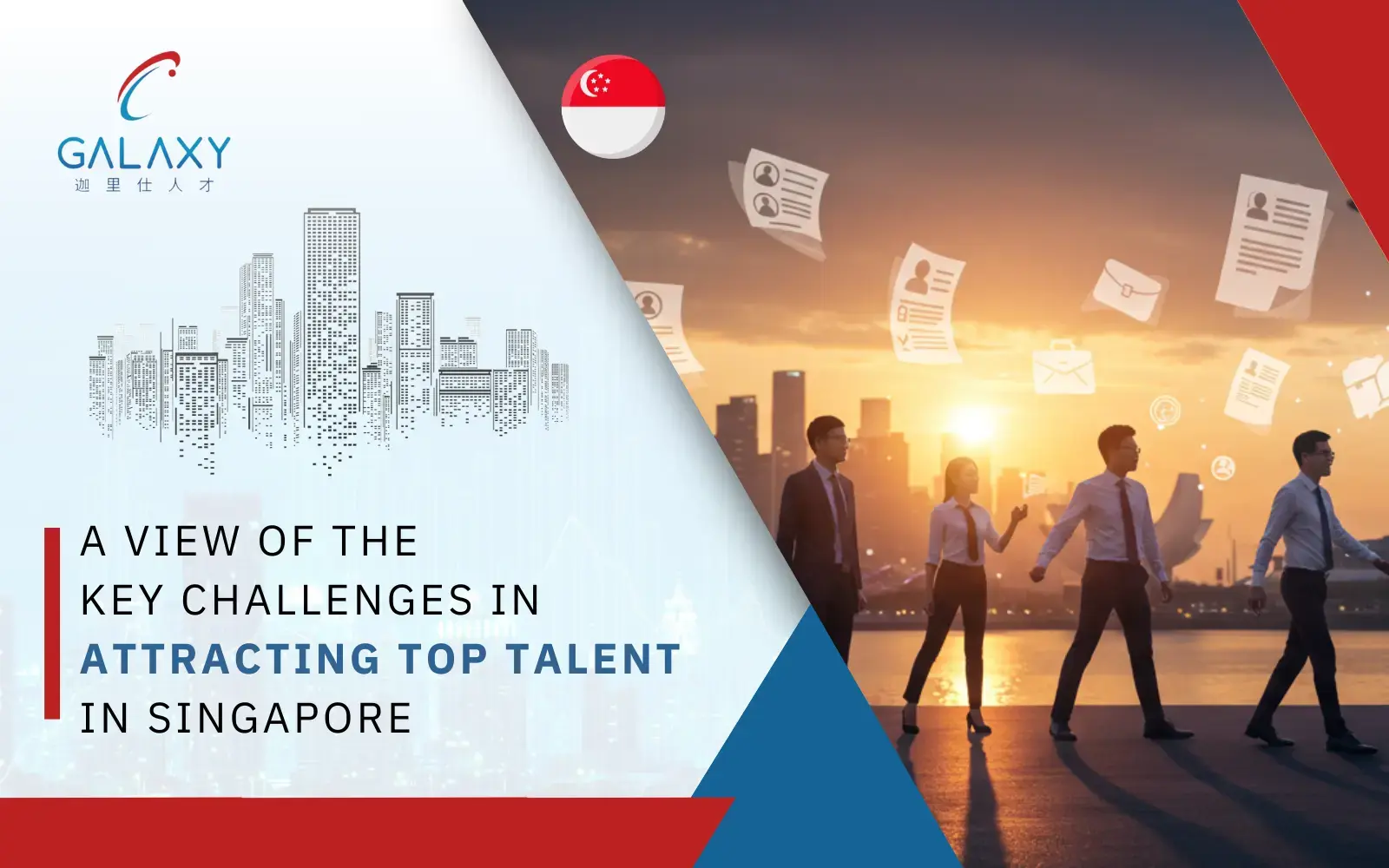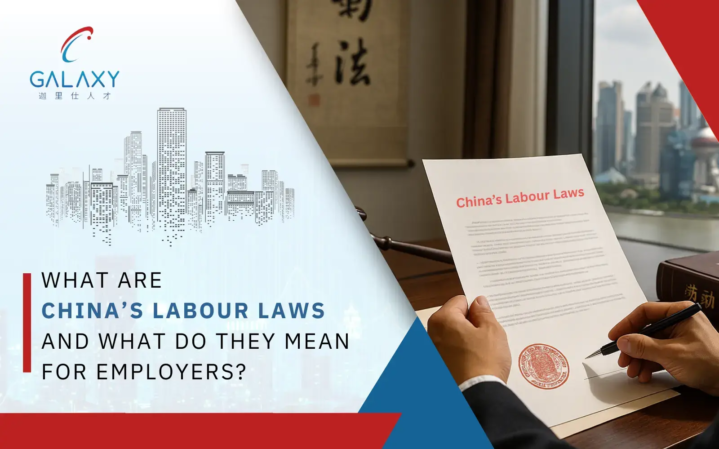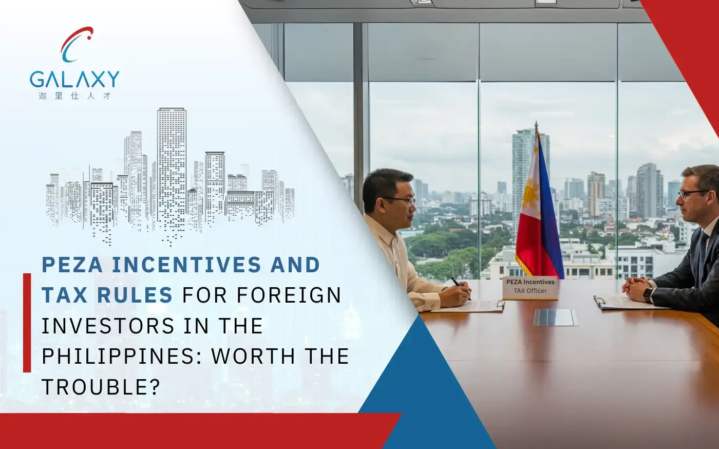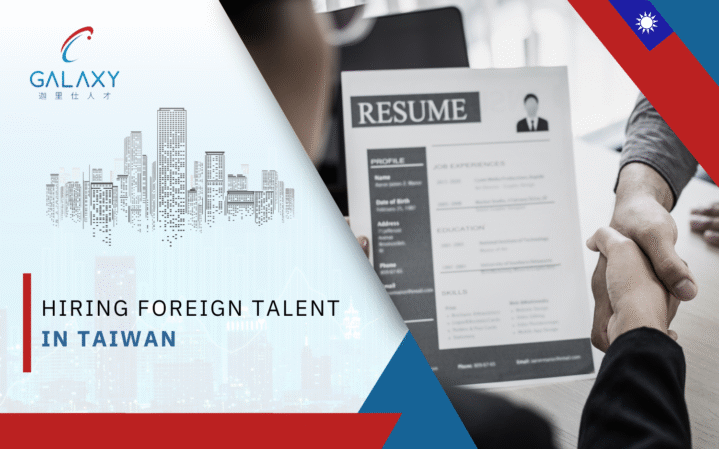A View of The Key Challenges in Attracting Top Talent in Singapore

Singapore has held a distinguished position as a strategic gateway to Asia and a global business hub. With its pro-business environment, highly developed infrastructure, and emphasis on innovation, it continues to attract international enterprises across sectors. However, this forward momentum brings with it a set of talent-related challenges.
From the pressures of digital transformation and evolving job expectations to rising operational costs and shifting global workforce dynamics, businesses now face significant obstacles in attracting and retaining top talent.
In this blog, we explore these pressing issues and share strategic recommendations, drawing on our expertise as a leading provider of EOR, payroll, compliance, and workforce support services across the Asia-Pacific region.
Explore how Galaxy EOR solutions in Singapore can simplify your hiring process.
Table Of Content
- What are the Key Workforce Challenges Employers Face in 2025?
- - Widening Skills Gap and Digital Transformation
- - Global Competition and Talent Shortage
- - Cost of Living vs Compensation
- - Employer Branding and Diversity
- - Flexibility and the New Work Paradigm
- Challenges vs Strategic Solutions faced by Employers in Singapore
- Conclusion
What are the Key Workforce Challenges Employers Face in 2025?
In today’s fast-changing world, employers are under growing pressure to keep up with a rapidly evolving workforce landscape. Organisations must now contend with widening skills gaps, heightened global competition for talent, inflationary pressures, and an evolving employee mindset. To navigate this terrain successfully, organisations need to be intentional about how they approach pay, flexibility, inclusivity, and how their brand is perceived by current and future employees.
Let’s explore what these changes really mean for employers and how they can rise to meet them.
1. Widening Skills Gap and Digital Transformation
Singapore’s Smart Nation vision has driven substantial investment in emerging technologies like AI, cybersecurity, blockchain, and green innovation. However, the demand for specialised talent continues to outpace supply. Companies often face prolonged hiring cycles due to a limited local talent pool and increasingly rely on foreign hires, adding layers of complexity around visas, payroll, and compliance.
2. Global Competition & Talent Shortage
As work becomes increasingly global, Singaporean employers are competing not just locally but with international firms and remote-first start-ups. This is driving higher turnover in sectors like tech, healthcare, and finance, as talent seeks better pay or flexibility. SMEs, in particular, struggle to retain staff amid stiff competition and limited employer branding.
- 83% of firms report talent scarcity, with transport (91%) and ICT sectors (88%) hit hardest.
- Salary demands are cited as a challenge by 38% of employers, while 36% report fierce competition among candidates.
- Flexibility and purpose are becoming more important to mid-career professionals than salary alone.
3. Cost of Living vs Compensation
Singapore’s status as one of the world’s most expensive cities continues to exert pressure on talent attraction and retention, particularly among early-career professionals and international hires. Rising costs in housing, transport, and daily living are prompting candidates to demand higher compensation to sustain a decent quality of life. This places a significant strain on employers, especially SMEs and start-ups, who often operate within tight payroll budgets.
According to recent data, Singapore’s median income rose from SGD 5,197 in 2023 to SGD 5,500 in 2024. Job movers, especially in high-demand fields like AI and data, are securing salary jumps of 12–20%, while those staying in their roles typically see more modest increases of 2–5%, in line with inflation.
As a result, some professionals are opting for remote roles based in lower-cost countries while still seeking the benefits of global career exposure.
Salary Increase in 2024
4. Employer Branding and Diversity Imperative
Today’s Gen Z and millennial workforce is increasingly values-driven, prioritising inclusivity, ethics, and purpose when choosing employers. Yet many organisations still struggle to align their employer brand with these expectations. Cultural misalignment, unclear company values, and unconscious bias in hiring continue to hinder progress.
- 72% of organisations recognise DEI (Diversity, Equity, and Inclusion) as a growing priority.
- Yet only 40% have formal DEI policies in place.
- 62% of Gen Z candidates would decline offers from companies that don’t clearly commit to DEI.
5. Flexibility and the New Work Paradigm
The COVID-19 pandemic catalysed a major shift toward remote and hybrid work. For many employees, flexibility is now a fundamental expectation rather than a perk. Remote and hybrid models have become standard expectations for recruitment.
- 65% of companies offer hybrid arrangements
- 31% of firms will increase contract/freelance hires in 2025, doubling from 2024
- 54% of employers rate AI literacy as vital, yet only 15% use AI tools in recruitment
Challenges vs Strategic Solutions faced by Employers in Singapore
As workforce dynamics continue to evolve, businesses must go beyond short-term fixes and adopt forward-thinking strategies that attract, engage, and retain top talent. Employers must take a comprehensive approach to remain competitive, given the rise in demands for flexibility and inclusion, skills-based hiring, and global compliance.
The following ten solutions offer a strategic roadmap for building a future-ready workforce in today’s increasingly borderless, values-driven, and tech-enabled world:
| Challenge | Strategic Solutions |
|---|---|
| 1. Employer Value Proposition (EVP) unclear | Build a strong EVP and clearly communicate your mission, values, career growth, and well-being promises. For example, highlight innovation-led initiatives, ESG efforts, and work-life harmonisation in employer branding. |
| 2. Cost-of-living pressures | Offer holistic compensation. Beyond salaries, include housing and transport allowances, wellness support, and flexible-work stipends, especially given Singapore’s high living costs. |
| 3. Complex cross-border hiring | Accelerate Onboarding with EOR & Visa Support. Use Employer of Record (EOR) services for fast, compliant hiring. Leverage Singapore’s ONE Pass for high-calibre global talent (S$30k/month or outstanding credentials), Tech.Pass for senior tech leaders (S$20k/month), and the Employment Pass for professionals earning at least S$5,000/month with relevant qualifications. |
| 4. Remote work policy lag | Implement hybrid workforce models and establish clear hybrid frameworks that ensure consistent engagement, productivity, and well-being across locations. |
| 5. Skills shortage | Shift to Skills-Based Hiring. Prioritise capabilities and experience over degrees. A Deloitte survey found 89% of executives believe skills-based hiring enhances diversity and performance. |
| 6. Talent stagnation | Upskill & Reskill Internally. Deliver targeted training and mentorship. With 50% of employees needing reskilling by 2025 (WEF), this is vital for agility and retention. |
| 7. Compliance risks | Ensure Remote Compliance. Use regional experts to manage payroll, tax, and statutory requirements, and keep pace with evolving labour laws, particularly for remote hires. |
| 8. Weak employer brand | Run employer branding campaigns. Encourage employee storytelling, showcase diversity efforts, and highlight ESG or social-impact work. Strong branding lowers cost-per-hire by ~43%. |
| 9. Unconscious bias | Adopt Bias-Aware Hiring. Use structured interviews, blind CVs, and interviewer training. Diverse teams outperform peers by 35%. |
| 10. Diversity, Equity, and Inclusion (DEI) under-action | Align with DEI standards. Introduce formal policies and partner with HR/DEI consultants. Over 60% of Gen Z candidates decline offers lacking clear DEI commitments, making this a retention and attraction imperative. |
Conclusion
The competition for talent in Singapore is no longer just about offering the highest salary. It requires a multi-dimensional approach that aligns with the evolving values and expectations of the workforce.
To succeed, organisations must:
- Adopt skills-first and flexible hiring practices
- Clearly communicate employer brand and purpose
- Provide future-focused, holistic compensation
- Enable borderless and inclusive workforce strategies
With over a decade of experience, Galaxy Group is uniquely positioned to help businesses address these challenges through its comprehensive solutions, including payroll outsourcing, EOR services, compliance advisory, and workforce strategy consulting, empowering organisations to scale confidently and compliantly across Asia.
Facing workforce challenges in Singapore or across Asia?
Galaxy Group’s proven strategies and tailored support ensure compliant, efficient workforce solutions for your business.
FAQ’S
How can companies legally hire remote workers across Asia?
Engaging an Employer of Record (EOR) expert like Galaxy Group allows companies to hire in different countries without setting up a legal entity, ensuring full compliance.
What is the importance of building a strong Employer Value Proposition (EVP)?
A well-defined EVP helps communicate your company’s purpose, culture, and benefits—crucial for attracting values-driven talent. With 69% of job seekers evaluating a company’s brand before applying, a clear EVP directly influences recruitment success and retention.
How does Galaxy Group support businesses in overcoming these challenges?
Galaxy Group provides end-to-end workforce support solutions across Asia-Pacific, including:
- Payroll outsourcing and payroll tax management
- Employer of Record (EOR) for compliant employment and onboarding
- Cross-border compliance advisory
- Talent and HR strategy consulting
These services help companies hire faster, stay compliant, and scale confidently.
What is an Employer of Record (EOR), and how does it work?
An EOR is a third-party provider that legally employs your talent on your behalf. It handles payroll calculation, payroll taxes, benefits, and compliance, enabling you to hire in new markets without setting up a local entity. This is ideal for companies expanding in APAC or hiring remote talent across borders.
Are Singaporean professionals open to flexible work arrangements?
Yes. Surveys have shown that hybrid work is now expected by a majority of the workforce, especially in knowledge-based industries.
Can smaller companies compete with MNCs in hiring talent?
Absolutely, SMEs can compete by emphasizing purpose-driven roles, career development opportunities, and flexible work setups. With the right support from EOR partners like Galaxy Group, smaller firms can hire employees in Singapore and access top-tier global talent.
How can I hire top international talent quickly and compliantly in Singapore?
You can use an Employer of Record (EOR) to streamline cross-border hiring without setting up a local entity. For top-tier professionals, Singapore offers specialized work passes:
- ONE Pass: For high-earning or exceptional global talent (≥ S$30,000/month or equivalent achievements).
- Tech.Pass: For senior tech leaders, founders, or professionals with strong credentials (≥ S$20,000/month or proven expertise).
- Employment Pass: For foreign professionals earning at least S$5,000/month with acceptable qualifications and relevant experience.




